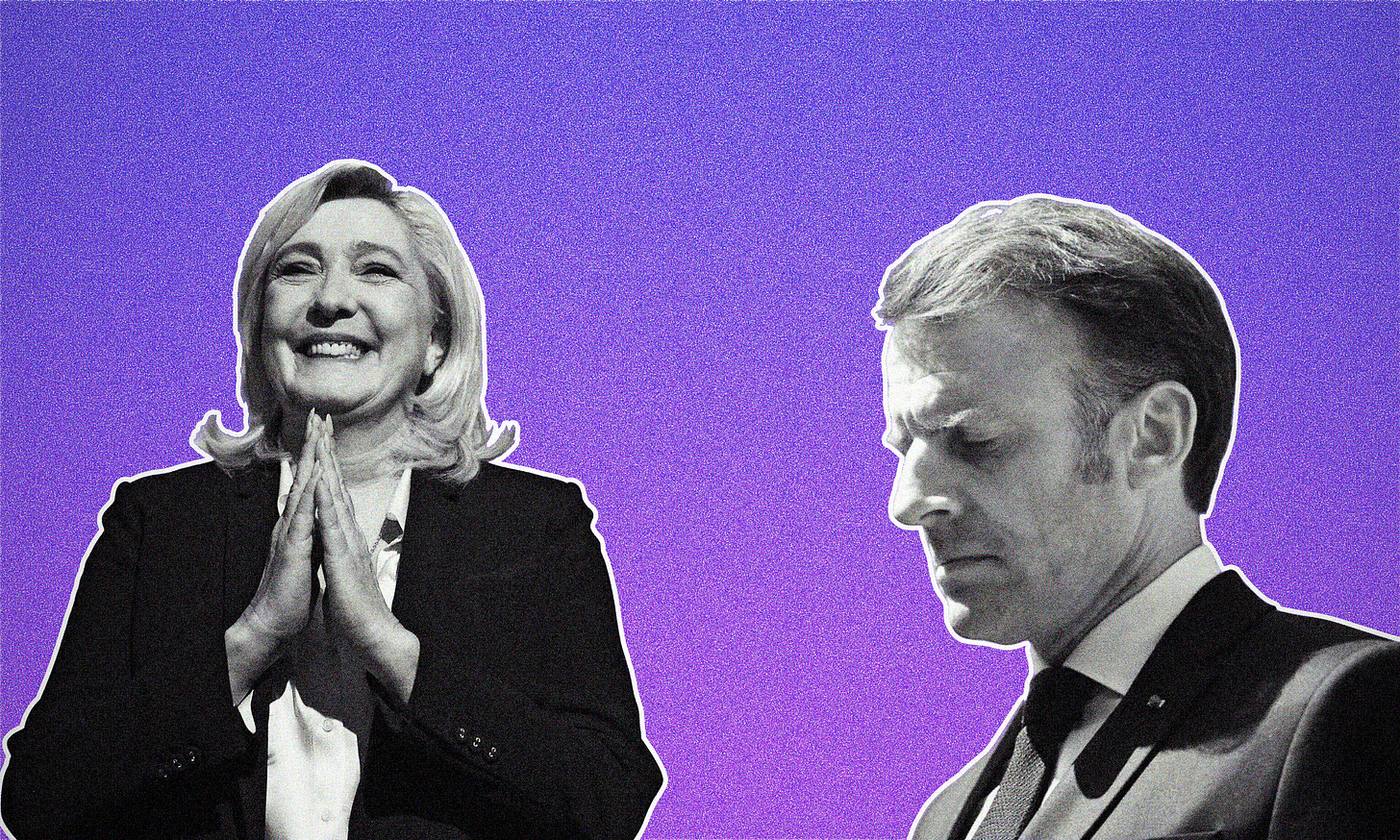The Failure of Macron’s Technocratic Governing Style Is Boosting the Nativist Right in France
Contrary to the French president’s aims, the cordon sanitaire that kept Le Pen’s National Rally out of the government is crumbling
With every passing day, the political crisis afflicting France increasingly resembles a bad soap opera, complete with absurd last-minute twists to prolong the suspense, watched by a tired audience sick of the same actors rehashing the same dramas with no resolution in sight. France, the second-largest economy in the European Union and the only nation from that body that has a permanent seat in the U.N. Security Council, is fresh off a shockingly chaotic government shake-up, which is only the latest—albeit the most explosive—episode in a longer arc of French political dysfunction.
But this is no TV drama. This is a crisis of massive significance. National Rally, the right-wing illiberal party led by Marine Le Pen, seeks to capitalize on this political turmoil and use it to come into power. How did France get to this point? In broad brushstrokes: via the failure of Macronism, whose elitist, technocratic style of governance has ushered in the very political forces it pledged to keep at bay.
Month of Madness
On Sept. 9, when the embattled French President Emmanuel Macron appointed Sébastien Lecornu, the former minister of the armed forces, as prime minister, he never imagined Lecornu’s government would dissolve within a few hours, making it the shortest-lived government in modern French history. Yet that’s exactly what happened. Lecornu—who was appointed following the dissolution of former Prime Minister François Bayrou’s government, which didn’t even last a year—spent 26 days in office before resigning on Oct. 6, and his government was active for a mere 14 hours before collapsing. Lecornu’s sensational exit was precipitated by intense political backlash over the composition of his new government.
Amazingly, that is not the end of Lecornu’s story. Undeterred by Lecornu’s decision to step down, Macron reappointed him prime minister on Oct. 10, a mere four days after he first resigned from the same post.
Time will tell whether Lecornu’s second premiership will outlast his first. France, after all, has had five different prime ministers in the past two years alone. But his narrow defeat of a no-confidence vote last week suggests the possibility of a path forward. Lecornu’s Cabinet actually faced two no-confidence votes, one from the hard-left France Unbowed and one from the far-right National Rally—but only the former came close to toppling Lecornu’s new government, ultimately falling 18 votes shy of the needed 289.
Why did the measure fail? Because Lecornu made key concessions to the Socialist Party: no more passing new laws without the Parliament’s consent, and a freeze on Macron’s signature pension reform that, among other things, raised the retirement age and required a longer period of contribution before receiving full benefits, until the next presidential election. In exchange, the Socialist Party, save for a handful of defectors, pledged non-involvement in the two no-confidence votes.
But this was just to get the government up and running. The business of actually governing in this impossibly fraught political environment now looms—indeed, The Guardian has described Lecornu’s next major task, getting a budget passed in this intensely gridlocked Parliament, as an “even greater challenge.”
But France’s issues are much larger than even the unprecedented turbulence of this past month would suggest. This is a country roiled by crippling crises—a significant political one, a potential regime or constitutional one, and even an economic one if a budget isn’t passed by December.
The Failure of Macronism
Macron’s victory over Le Pen in the 2017 and then the 2022 presidential elections seemed to decisively settle the political path the country would follow. The central binary in French politics became a choice between the far right and Macron’s technocratic liberalism, with leftist options marginalized. Yes, the French electorate twice chose Macron over Le Pen, but in 2022 it was a “lesser-evil” choice: the public voted against Le Pen rather than for Macronism as a political and socioeconomic project. That year, Macron won another five-year term, but for the first time in over three decades a reelected incumbent president failed to secure a parliamentary majority. Since then, the polarization of French politics has only increased and seems now durably divided into a three-bloc system, with none of the blocs able to reach a 289 seats to govern as a majority.
In the 2024 election, National Rally came in first in votes (more than 10 million) and MPs (89—142 with their allies). But none of France’s other parties were willing to include it in a governing coalition (more on that below). The leftist parties actually came in first if we construe them as a collective—they ran together on a joint list as the New Popular Front or NUPES, with nine million votes and 180 seats—but not as individual parties. Their coalition has been fragile, with acute divisions between the Socialist Party, the Greens, and the more radical France Unbowed, which leads the leftist bloc with 74 seats. The third bloc, the informal coalition known as the “common basis” (socle commun), united the classic right, the Republicans, the centrists, and the various Macronist parties. A post-election, ad hoc bloc, they combined for a total of 211 MPs.
At present, the leftist coalition is in the process of collapsing and the “common basis” imploded two weeks ago. There’s a structural reason for that: France’s Fifth Republic, whose constitution, institutions, and politics were inaugurated in 1958 after a period of instability in the Fourth Republic (1946-1958), only functions well when the president has a favorable majority in Parliament—which is no longer the case—or, in the event of a coalition government, when there is a clear right-left cohabitation (a president from the left and a prime minister from the right, or vice versa). But Macron has systematically refused any cohabitation project because he sees himself as a “shield” against the extremes on the left and right.
Macron cannot accept the idea of a governing partnership with the far right, as he’s built a large part of his political legitimacy on stressing the binary opposition between the Europhiles and nationalists, the liberals and illiberals, the forward-looking and the backward-looking. Having faced Le Pen in the second round of both of his presidential campaigns, Macron considers his core legacy to be a bulwark against the far right. At the international level, he has vied for leadership in affirming Europe’s strategic autonomy against Russia and its support for Ukraine and sees Le Pen as Putin’s asset. And indeed, Macronists are panicking at the prospect of the National Rally, with its ties to Moscow, accessing France’s strategic levers, including to its nuclear weapons.
But Macron has also refused to name a prime minister from the social-democratic left, even when it was clear, especially after the first Lecornu government fell, that the Socialist Party was ready to govern without France Unbowed. Between June of 2024 and this past month, Macron vehemently rejected the leftist bloc’s two main conditions for participating in a coalition: One, freezing his signature pension reform (the only one he has been able to pass since 2022), which was passed by decree against the Parliament’s will and generated massive protests; and two, passing the Zucman tax (a 2% minimum annual tax on the richest 2,000 households).
That’s why Macron was insistent on naming a prime minister from his own informal “common basis” coalition: first a conservative Gaullist, Michel Barnier; then, the centrist Bayrou; and then, his very close friend and ally, Lecornu. But by naming—and then renaming—Lecornu prime minister, Macron has cut a remarkably out of touch figure, unable or unwilling to reckon with the shifting political realities. Lecornu, considered one of the last of the Macronists, represents the president’s dogged insistence on moving forward with a government made up of his closest allies precisely at a time when much of the French public is clamoring for a broader governing coalition.
Macron’s inability to gain a majority means he has had to form minority governments since 2022—leading to a measure of governmental instability; this was the third government to fail since June 2024, and the seventh government formed since his first presidential victory in 2017. Minority governments are inherently fragile as they keep would-be coalition partners outside the governing fold, which produces more legislative gridlock and governing instability.
Now, just 20 months out from the next presidential election in 2027, Macron is a lame-duck leader who is deeply unpopular; the latest opinion polls show his approval ratings at 14%. The French political system is already in pre-campaign mode: everyone is focused on the coming election, where polling suggests that National Rally could garner 35% of the vote in the first round. In the eyes of the public, all the “new wolves” from the right and the center-right who are vying for prominence in a post-Macronist era—Gérard Darmanin, Laurent Wauquiez, Bruno Retailleau, Gabriel Attal—care more about their own political ambitions than about guiding France through the crisis. So widespread is this belief that Lecornu publicly declared that only those with no presidential aspirations can be part of his second government (although he made one exception for Darmanin, brought back as Justice Minister).
Cordon Blues
Although Macron sees his core political identity, and lasting legacy, as being a reliable shield against the far right, the reality is that he has actually contributed to it gaining a foothold in France. For years, French people have been assured that there exists a rigid cordon sanitaire against the far right that unites all the other parties, and instructed that divisions between the “republican arc” should be minimized or ignored in order to keep the far right out of power. In practice, however, mainstream parties such as the Republicans and sometimes the Macronists have themselves adopted some of National Rally’s policies and rhetoric on immigration and security themes, incorporating and in fact normalizing rather than marginalizing the party. It’s not much of a cordon sanitaire if it merely keeps out the party but not its policies.
But the mainstream parties, and Macron in particular, have also applied a cordon sanitaire to France Unbowed, now seen by the Macronists as a pariah equal, and at times even worse than, the National Rally—especially since France Unbowed has taken strong pro-Palestinian positions in the past two years.
The alliance between Macronists and the Republicans, already fragile, exploded, with the former ministry of the interior and ambitious leader of the Republicans, Bruno Retailleau, deciding to leave the first Lecornu government, facilitating its folding, and then dissuading Republicans from joining the current one. And, indeed, a growing number of Republicans have openly broken the once-sacred cordon sanitaire: former President Nicolas Sarkozy declared on Sept. 3 that National Rally was “inside the arc of the Republic” and a legitimate actor to cooperate with, whereas France Unbowed was not. Retailleau went further, saying that he prefers to vote for National Rally than for the left—including the Socialists. And now, for the first time, 53% of French citizens oppose the cordon sanitaire—a potentially massive shift, since keeping the far right at bay depends on keeping the National Rally from amassing 50% of the vote in the second round of presidential elections. At the moment, the “Union of the Right” (the idea that the classic right and the far right can govern together) project appears to be electorally viable, which would make National Rally the big winner.
Even with Lecornu passing the no-confidence vote test, the crisis in French politics remains. The political class is widely despised by the French public. For two years the government told French citizens there is no way that pension reform can be adjourned without the economy collapsing (freezing the pension age at 62 rather than 64 would be too costly for the state budget)—only to freeze it in order to rescue a government shutdown. Two-thirds of French citizens have asked for new parliamentary elections, but the majority of the MPs, especially the “common basis” ones, are against it, for fear of losing their seats to the National Rally.
It seems a given now that the Macronist political order is coming to an end. Macron implemented a concentrated decision-making system limited to a narrow circle of advisors, sidelining intermediary bodies such as political parties, unions, and local authorities. This has deepened the perceived gap between governing elites and ordinary citizens. Technocratic expertise and executive decrees gave his reform efforts the appearance of being imposed rather than debated, reinforcing a massive distrust toward democratic institutions (only one quarter of the population believes in the efficacy of political processes, versus 47% in Germany and 39% in Italy). With rising social tensions, the discontent was increasingly channeled into anti-system parties on the far right and far left.
What began in 2017 as a promising national story in France now looks like a debacle, at least on the domestic front (Macronism’s legacy on the international stage is a discussion for another day). But the real legacy will be visible with the 2027 election, a landmark for the country as well as for Europe. After 10 years of Macronism, it will show whether such a personality-driven movement, supposedly “neither right not left,” can survive its leader, whether the Republican and Socialist parties can be reborn after their near political deaths, and whether France will continue to observe a cordon sanitaire or grant the reins to the illiberal right.
A new era is about to begin in France now that the curtain is coming down on Macron and Macronism.
© The UnPopulist, 2025
Follow us on Bluesky, Threads, YouTube, TikTok, Facebook, Instagram, and X.
We welcome your reactions and replies. Please adhere to our comments policy.









Well done! Thanks.
"... especially since France Unbowed has taken strong pro-Palestinian positions in the past two years."
I would have thought that it had something to do with the fact that France Unbowed is a pro-Putin, anti-NATO, anti-Ukraine party. On Ukraine, it has been a consistent cheerleader for Trump and MAGA, and if Trump announced tomorrow that all US troops will be pulled from Europe, some of the loudest cheers in Europe would come from it. And on trade, France Unbowed is a proponent of Trumpian protectionism: alongside French withdrawal from NATO, another central policy plank is French withdrawal from free trade agreements.
But in this entire post, which is thus completely out of character for the general editorial line of The UnPopulist, there is not a word about this.
This is also why Macronism's legacy on the international stage is absolutely not "a discussion for another day". It is a discussion for today, and is to be compared to the legacy of France Unbowed on the international stage, and to the equally pro-Putinist legacy of the National Rally on the international stage.
(I was also interested in the claim that "two-thirds of French citizens have asked for new parliamentary elections". Where exactly have they "asked for" this? Has there been some kind of petition signed by 45,000,000 French citizens that has escaped being reported in the media?)